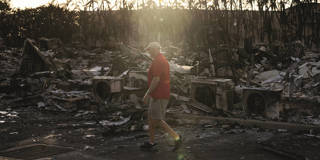Climate change is not only destroying lives and livelihoods, but also introducing new systemic risks to the financial system and the broader economy. The warning signs of another 2008-scale financial crisis are flashing red across multiple economic sectors, and behind them looms the collapse of Earth’s natural systems.
WASHINGTON, DC – This June was the hottest on record, and it was followed by the hottest-ever week in early July, which then turned out to be the hottest month on record. Canada’s unprecedented wildfires blanketed huge swaths of North America in smoke; storms in Vermont, New York, and Pennsylvania triggered deadly floods; the Midwest has been experiencing its worst drought in over a decade; Europe is baking; China hit record-high temperatures; and Italy suffered its worst flooding in 100 years.
Climate change is here, and it is destroying lives and livelihoods. In addition to causing some 250,000 deaths around the world each year, fossil-fuel emissions are creating mounting economic costs. In 2022, weather-related damage in the United States topped $165 billion, making it the third-costliest year on record.
Behind these headlines, the US Senate Budget Committee has taken a deeper dive into the economic and fiscal risks of fossil-fuel emissions. In ten hearings so far, we have heard from central bankers, financial experts, economists, insurance executives, political leaders, and others. What has stood out – and what I keep coming back to – is that behind the immediate cost of emissions-driven natural disasters loom “systemic risks” to the US and global economy. By definition, “systemic” risks cascade beyond immediately affected sectors and inflict widespread economic damage (recall how the 2008 financial crisis spilled well beyond banks holding bad mortgages).

WASHINGTON, DC – This June was the hottest on record, and it was followed by the hottest-ever week in early July, which then turned out to be the hottest month on record. Canada’s unprecedented wildfires blanketed huge swaths of North America in smoke; storms in Vermont, New York, and Pennsylvania triggered deadly floods; the Midwest has been experiencing its worst drought in over a decade; Europe is baking; China hit record-high temperatures; and Italy suffered its worst flooding in 100 years.
Climate change is here, and it is destroying lives and livelihoods. In addition to causing some 250,000 deaths around the world each year, fossil-fuel emissions are creating mounting economic costs. In 2022, weather-related damage in the United States topped $165 billion, making it the third-costliest year on record.
Behind these headlines, the US Senate Budget Committee has taken a deeper dive into the economic and fiscal risks of fossil-fuel emissions. In ten hearings so far, we have heard from central bankers, financial experts, economists, insurance executives, political leaders, and others. What has stood out – and what I keep coming back to – is that behind the immediate cost of emissions-driven natural disasters loom “systemic risks” to the US and global economy. By definition, “systemic” risks cascade beyond immediately affected sectors and inflict widespread economic damage (recall how the 2008 financial crisis spilled well beyond banks holding bad mortgages).